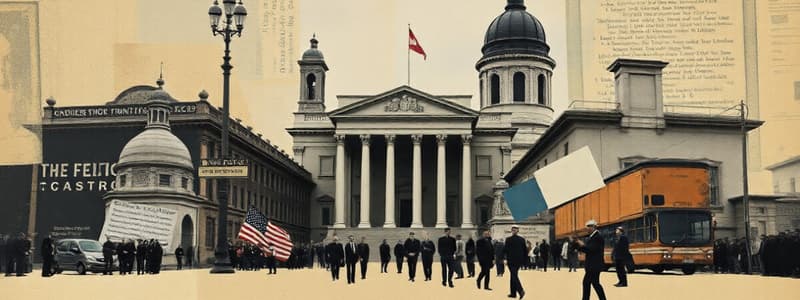Podcast
Questions and Answers
Which system of government features a president who is not accountable to the legislature?
Which system of government features a president who is not accountable to the legislature?
- Presidential System (correct)
- Semi-presidential System
- Chancellor-type System
- Parliamentary System
What defines the primary feature of a Chancellor-type system?
What defines the primary feature of a Chancellor-type system?
- Parliament is not supreme
- The government can dissolve the parliament
- A separate head of state is required
- Presence of a constructive vote of no-confidence (correct)
In which system is the government accountable to both the parliament and the president?
In which system is the government accountable to both the parliament and the president?
- Republic System
- Monarchy
- Semi-presidential System (correct)
- Directorial System
What is a significant feature of the parliamentary system of government?
What is a significant feature of the parliamentary system of government?
Which of the following is true regarding Directorial Systems?
Which of the following is true regarding Directorial Systems?
Which system allows the head of state to issue decrees and dissolve the parliament?
Which system allows the head of state to issue decrees and dissolve the parliament?
What distinguishes a majority government from a minority government?
What distinguishes a majority government from a minority government?
In a system where the executive is independent from the legislature, which of the following applies?
In a system where the executive is independent from the legislature, which of the following applies?
In a semi-presidential system, which of the following roles does the president not fulfill?
In a semi-presidential system, which of the following roles does the president not fulfill?
What key feature differentiates a parliamentary system from a presidential system?
What key feature differentiates a parliamentary system from a presidential system?
Which of the following statements is true regarding chancellor-type systems?
Which of the following statements is true regarding chancellor-type systems?
In directorial systems, which characteristic is unique compared to other systems?
In directorial systems, which characteristic is unique compared to other systems?
Which option best describes the accountability structure of the government in a semi-presidential system?
Which option best describes the accountability structure of the government in a semi-presidential system?
What is a notable attribute of majority governments compared to coalition governments?
What is a notable attribute of majority governments compared to coalition governments?
Which of the following is a common misconception about the powers of a head of state in a parliamentary system?
Which of the following is a common misconception about the powers of a head of state in a parliamentary system?
In the context of political capacity, what distinguishes a united government from a divided government?
In the context of political capacity, what distinguishes a united government from a divided government?
Flashcards
Presidential System
Presidential System
A system where the president is both head of state and government, is elected directly, and is not accountable to the legislature.
Parliamentary System
Parliamentary System
A system where the head of government (e.g., Prime Minister) is chosen by the legislature and is accountable to it.
Semi-Presidential System
Semi-Presidential System
A system with both a directly elected president and a prime minister who is accountable to parliament, but the president has veto/other powers and appoints government members
Chancellor System
Chancellor System
Signup and view all the flashcards
Directorial System
Directorial System
Signup and view all the flashcards
Head of State
Head of State
Signup and view all the flashcards
Head of Government
Head of Government
Signup and view all the flashcards
United vs. Divided Government
United vs. Divided Government
Signup and view all the flashcards
Monarchy
Monarchy
Signup and view all the flashcards
Republic
Republic
Signup and view all the flashcards
Chancellor-type system
Chancellor-type system
Signup and view all the flashcards
Study Notes
Forms of Government
- Sources for head of state power include monarchy and republic.
- Monarchy power often based on hereditary right.
- Republic power usually derived from popular election.
Systems of Government
- Systems focus on how the executive and legislature relate.
- Presidential systems commonly feature a President elected for a fixed term by the people.
- The President isn't accountable to the legislature, appoints administration members, can issue decrees, and has a veto power but can't dissolve the legislature. Examples include the USA (1787).
- Semi-presidential systems, France (1958) have a president and prime minister, both elected by different methods.
- The president appoints government members and the government is accountable to the legislature while the President can dissolve the legislature.
- Parliamentary systems, UK, feature a separate head of state (symbolic) and head of government (Prime Minister) with the PM and the government accountable to the parliament. The PM can dissolve the parliament.
- Chancellor-type systems, Germany (FRG 1949) have a quasi-parliamentary system with a strengthened head of government who experiences a "constructive vote of no confidence." A key feature is how ministers are restricted in accountability to the parliament.
- Directorial systems, Switzerland (1848), parliament elects the government. The government is independent of the legislature.
Autonomy of Governments
- Party programmes and selection of government members determine autonomy.
- Influence of parties and party control over government are factors.
- Presidentialisation and personalisation of roles of individuals in politics are a consideration.
Political Capacity
- Systems can be categorized as 'united' or 'divided'.
- Governments can be 'majority', 'minority', 'one-party', or 'coalition' governments.
Studying That Suits You
Use AI to generate personalized quizzes and flashcards to suit your learning preferences.



